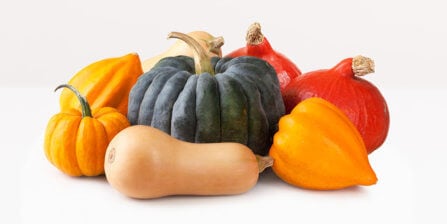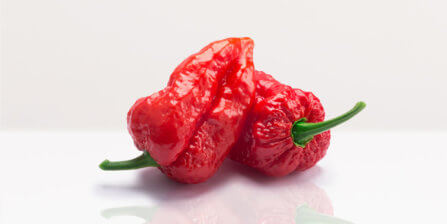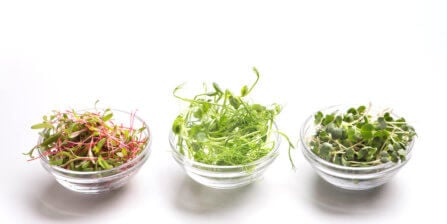Grocery Guides
Acorn Squash – All You Need to Know | The Instacart Guide to Fresh Produce

What is acorn squash?
Acorn squash is a thick-skinned member of the squash family. It takes its name from the fruit of the oak tree, and the two look similar in terms of shape, if not size.
Acorn squash is technically a fruit, but it’s often thought of as a winter vegetable. The skin is typically a dark shade of green, perhaps with a flash of orange, but acorn squash can come in lighter yellows and whites. What really helps it stand out from other types of squash is its distinctive ridged exterior. Cutting the squash open reveals flesh that can range in color from yellow to bold orange. The flesh is slightly sweet and buttery, and acorn squash is an adaptable ingredient that can be roasted, used to make hearty winter soups, or baked in a pie.
Where did acorn squash originate from?
Acorn squash is believed to have originated in Central America, but it’s common throughout both North and Central America. In fact, some estimates believe it has been grown and eaten in this part of the world for over 8,000 years. Native Americans used acorn squash extensively and introduced it to colonial settlers in the early days of European migration to the Americas.
What is the nutritional value of acorn squash?
A one-cup (205g) serving of cooked acorn squash (including the skin) contains 115 calories, 30g of carbs, 0.3g of fat, 2g of protein, and 9g of fiber.
Nutritionally, acorn squash has much in common with other types of squash. It’s a good source of vitamin C, accounting for 37 percent of DV, vitamin A (18 percent DV), and several B vitamins. Acorn squash also provides around a quarter of your daily intake of magnesium, manganese, and potassium, and it’s high in antioxidants, which are believed to protect against a range of serious illnesses.
Do you eat the skin of acorn squash?
Absolutely. The skin of acorn squash becomes nice and soft when it’s roasted for long enough, so it’s easy to cut and eat. You’ll definitely want to eat it – the skin tastes great and contains some of those key nutrients like insoluble fiber.
How is acorn squash grown?
Acorn squash is planted in spring and grown from seeds planted in soil. The squash grows on the vine, and is ready to be harvested after around eighty to one hundred days – the toughening of the skin is a sign of ripeness. Acorn squash is fragile and easily damaged by frost, so it has to be harvested early enough to avoid that risk. Acorn squash grows in most parts of the United States.
When is acorn squash in season?
Like many thick-skinned squashes, acorn squash enters its peak season in early fall, and it continues to be in season through the winter. However, you’ll find it in the produce aisle alongside other fresh vegetables of most good grocery stores throughout the year.
How do you pick acorn squash at the grocery store?
First, you can learn a lot from the color of acorn squash. As a simple rule, the greener, the better. A little splash of orange is fine, but too much orange is a sign that the squash has over-ripened. A squash that is past its prime will be dry and noticeably stringy in texture.
Next up, examine the skin, which should be smooth and firm. Avoid acorn squash that is cracked or squishy, even if only in patches. You’re also looking for the skin to be relatively dull in tone, which indicates the squash was left on the vine until ripe. In contrast, a shiny squash will lack the sweetness that makes a good acorn squash so delicious.
Remember, customers can use Instacart to pass specific requests on to our shoppers. That means you can share these tips to help your shopper pick out the best acorn squash in the produce section!
How to store acorn squash?
Raw, whole acorn squash should be stored in a cool, dry place rather than in the refrigerator. The sweet spot for this fussy vegetable is around 50-55°F. Just as frost can threaten the squash prior to harvest, the lower temperatures of a refrigerator can also be similarly damaging.
Once the squash has been cooked, it should be stored in the refrigerator in a sealed container. Similarly, if the squash has been cut but not cooked, cover the exposed flesh with plastic wrap and refrigerate.
How long does acorn squash last?
Whole and uncooked, acorn squash will last for somewhere between a month and two months if stored properly. Cut or cooked acorn squash should be kept in the refrigerator and used within around 4 days. If you plan on keeping it for longer, freeze it.
How to tell if acorn squash is bad?
A squash that has turned orange is over-ripe, but that doesn’t necessarily mean it has gone bad. If it’s no longer firm to touch, don’t use it. If you’re unsure, cut the squash open to take a look at the flesh and seeds. Warning signs to look for are dull flesh and seeds that are slimy and gray. Likewise, if the squash smells bad, throw it away.
What can I substitute for acorn squash?
Pumpkin, butternut squash, or buttercup squash are all go-to substitutes for acorn squash. All of these replicate the golden-orange color of the acorn squash, but with subtle differences of flavor and texture. The flesh of butternut squash is smoother than the stringy acorn squash, and butternut squash is sweeter, with its own characteristic nuttiness. Buttercup squash is sweeter, more creamy, and drier than acorn squash. If the pumpkin’s distinct flavor won’t throw your dish off, it can also be used as a less sweet substitute for acorn squash.
Most Recent in Grocery Guides

Grocery Guides
Guide to Sustainable Grocery Delivery
Who has time for the grocery store these days? Between work, family and everything else, it feels like a chore we could all do without. That's where sustainable grocery delivery comes in! You get the…
Feb 7, 2025
Grocery Guides
19 Best Milk Substitutes for Baking and Cooking
Milk’s rich texture and neutral flavor make it a staple in countless recipes, bringing creaminess and balance to sweet and savory dishes alike. But what happens if you run out of milk or need a…
Jan 30, 2025
Grocery Guides
15 Best Cheeses for Your Next Charcuterie Board
Let’s face it: The heyday of the store-bought party platter is long gone. Now, the duties of a good host often include curating an impressive charcuterie board. But where do you begin? Charcuterie boards typically…
Jan 21, 2025

 Squash – All You Need to Know | Instacart Guide to Fresh Produce
Squash – All You Need to Know | Instacart Guide to Fresh Produce  Ghost Pepper – All You Need to Know | Instacart Guide to Fresh Produce
Ghost Pepper – All You Need to Know | Instacart Guide to Fresh Produce  Sprouts – All You Need to Know | Instacart Guide to Fresh Produce
Sprouts – All You Need to Know | Instacart Guide to Fresh Produce 

